英语省略句型
- 格式:ppt
- 大小:136.50 KB
- 文档页数:11
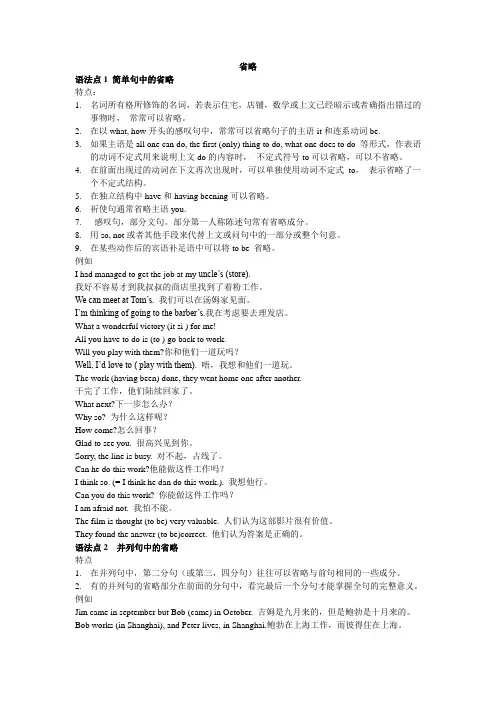
省略语法点1 简单句中的省略特点:1.名词所有格所修饰的名词,若表示住宅,店铺,数学或上文已经暗示或者确指出错过的事物时,常常可以省略。
2.在以what, how开头的感叹句中,常常可以省略句子的主语it和连系动词be.3.如果主语是all one can do, the first (only) thing to do, what one does to do 等形式,作表语的动词不定式用来说明上文do的内容时,不定式符号to可以省略,可以不省略。
4.在前面出现过的动词在下文再次出现时,可以单独使用动词不定式to,表示省略了一个不定式结构。
5.在独立结构中have和having beening可以省略。
6.祈使句通常省略主语you.7.感叹句,部分文句。
部分第一人称陈述句常有省略成分。
8.用so, not或者其他手段来代替上文或问句中的一部分或整个句意。
9.在某些动作后的宾语补足语中可以将to be 省略。
例如I had managed to get the job at my uncle’s (store).我好不容易才到我叔叔的商店里找到了着粉工作。
We can meet at Tom’s. 我们可以在汤姆家见面。
I’m thinking of going to the barber’s.我在考虑要去理发店。
What a wonderful victory (it si ) for me!All you have to do is (to ) go back to work.Will you play with them?你和他们一道玩吗?Well, I’d love to ( play with them). 唔,我想和他们一道玩。
The work (having been) done, they went home one after another.干完了工作,他们陆续回家了。
What next?下一步怎么办?Why so? 为什么这样呢?How come?怎么回事?Glad to see you. 很高兴见到你。
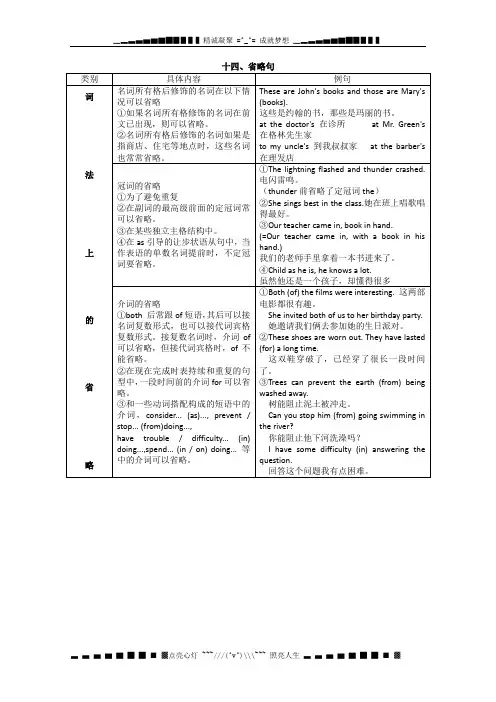
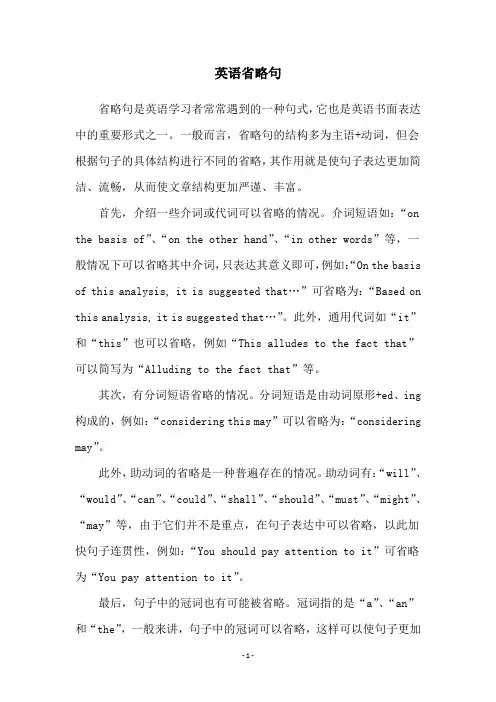
英语省略句省略句是英语学习者常常遇到的一种句式,它也是英语书面表达中的重要形式之一。
一般而言,省略句的结构多为主语+动词,但会根据句子的具体结构进行不同的省略,其作用就是使句子表达更加简洁、流畅,从而使文章结构更加严谨、丰富。
首先,介绍一些介词或代词可以省略的情况。
介词短语如:“on the basis of”、“on the other hand”、“in other words”等,一般情况下可以省略其中介词,只表达其意义即可,例如:“On the basis of this analysis, it is suggested that…”可省略为:“Based on this analysis, it is suggested that…”。
此外,通用代词如“it”和“this”也可以省略,例如“This alludes to the fact that”可以简写为“Alluding to the fact that”等。
其次,有分词短语省略的情况。
分词短语是由动词原形+ed、ing 构成的,例如:“considering this may”可以省略为:“considering may”。
此外,助动词的省略是一种普遍存在的情况。
助动词有:“will”、“would”、“can”、“could”、“shall”、“should”、“must”、“might”、“may”等,由于它们并不是重点,在句子表达中可以省略,以此加快句子连贯性,例如:“You should pay attention to it”可省略为“You pay attention to it”。
最后,句子中的冠词也有可能被省略。
冠词指的是“a”、“an”和“the”,一般来讲,句子中的冠词可以省略,这样可以使句子更加简洁。
例如:“He took the car and drove away”可省略为“He took car and drove away”。
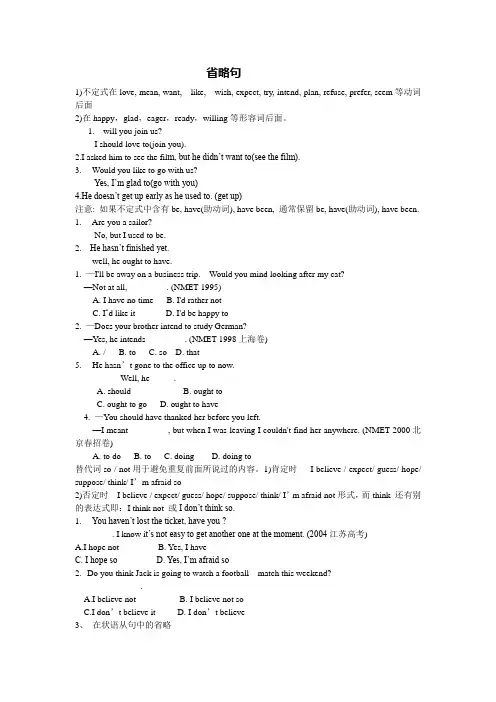
省略句1)不定式在love, mean, want, like, wish, expect, try, intend, plan, refuse, prefer, seem等动词后面2)在happy,glad,eager,ready,willing等形容词后面。
1.---will you join us?--- I should love to(join you).2.I asked him to see the fil m, but he didn’t want to(see the film).3.--- Would you like to go with us?--- Yes, I’m glad to(go with you)4.He doesn’t get up early as he used to. (get up)注意: 如果不定式中含有be, have(助动词), have been, 通常保留be, have(助动词), have been.1.--- Are you a sailor?--- No, but I used to be.2.---He hasn’t finished yet.---well, he ought to have.1. —I'll be away on a business trip. Would you mind looking after my cat?—Not at all, ________ . (NMET 1995)A. I have no timeB. I'd rather notC. I‘d like itD. I'd be happy to2. —Does your brother intend to study German?—Yes, he intends ________ . (NMET 1998上海卷)A. /B. toC. soD. that5.--- He hasn’t gone to the office up to now.--- Well, he _____.A. shouldB. ought toC. ought to goD. ought to have4. —You should have thanked her before you left.—I meant ________ , but when I was leaving I couldn't find her anywhere. (NMET 2000北京春招卷)A. to doB. toC. doingD. doing to替代词so / not用于避免重复前面所说过的内容。

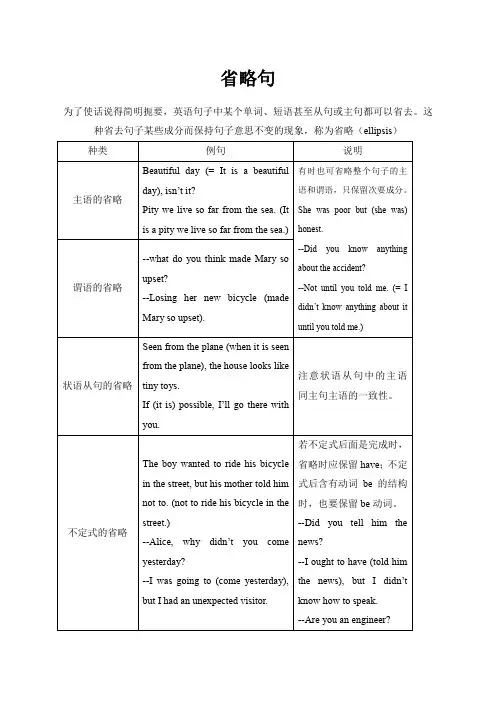
省略句为了使话说得简明扼要,英语句子中某个单词、短语甚至从句或主句都可以省去。
这种省去句子某些成分而保持句子意思不变的现象,称为省略(ellipsis)Ⅰ、状语从句中的省略用法一、如果从句的主语和主句的主语一致,且从句的谓语含有be动词的某种形式(am/is/are/was/were),可同时省略从句的主语和be动词的某种形式。
1、when,while引导的时间状语从句e.g. Do be careful when (you are) crossing the street.When/While (I was) on my way to work, I met her.2、if,unless,once引导的条件状语从句e.g. If (it is) properly treated, waste will do no harm to the environment.I’ll not go to the party unless (I am) invited.Once (you are) caught stealing in a supermarket, you will be punished.3、though,although,whether,no matter whether/what/how/who等引导的让步状语从句e.g. He was happy, though/although (he was) poor.Whether (she is) sick or well, she is always cheerful.No matter how/However hard the task (is), we must fulfill it in time.(注:从句的主语和主句的主语不一致时,只省略从句中的be动词形式)4、as if,as though引导的方式状语从句e.g. He rubbed his eyes and yawned as if/though (he was) waking up after a longsleep.He stood up as if/though (he wanted) to leave.(as if/though + to do表示一个将来的动作)二、than,as引导的比较状语从句中的省略用法:当不同的主语进行比较时,一般省略从句中的谓语;当从句中的主语与谓语(be动词除外)和主句中的主语与谓语相同时,通常省略从句中的主语和谓语,只保留比较部分。
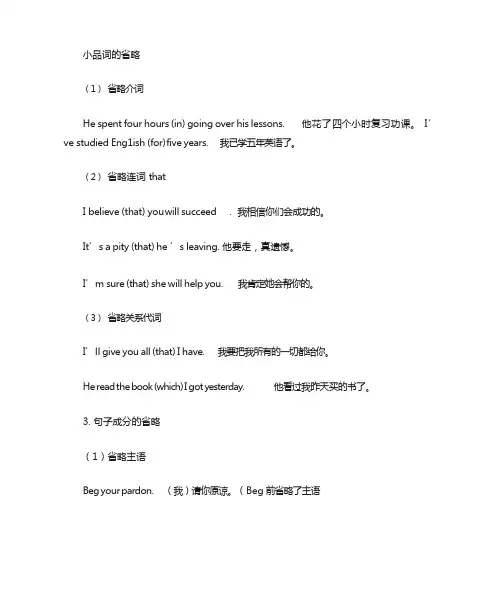
小品词的省略(1)省略介词He spent four hours (in) going over his lessons. 他花了四个小时复习功课。
I ’ ve studied Eng1ish (for) f ive years. 我已学五年英语了。
(2)省略连词 thatI believe (that) you w ill succeed .我相信你们会成功的。
It’s a pity (that) he ’s leaving. 他要走,真遗憾。
I’m sure (that) she will help you. 我肯定她会帮你的。
(3)省略关系代词I’ll give you all (that) I have. 我要把我所有的一切都给你。
He read the book (which) I got yesterday. 他看过我昨天买的书了。
3. 句子成分的省略(1)省略主语Beg your pardon. (我)请你原谅。
(Beg 前省略了主语I)Take care! 当心!(Ta ke 前省略了主语 you )II)Looks as if it will rain. 看起来象要下雨。
(Looks 前省略了主语 it)III)(2)省略谓语Who next? 该谁了?( Who 后面省略了谓语 comes )The river was deep and the ice thin. (ice 后面省略了 was )We ’ll do the best we can. 我们将尽力而为。
(can 后面省略了动词 do )(3)省略表语Are youready? Yes, I a m.你准备好了吗?我准备好了。
(am 后面省略了ready )He was a lover of sports as he had been in his youth. 他还是象年轻时那样,是一位运动爱好者。
(had been 后面省略了 a lover of sports )(4)省略宾语Let’s do the d ishes.I’ll wash and you ’ll dry. 让我们洗碗吧,我来洗,你来揩干。
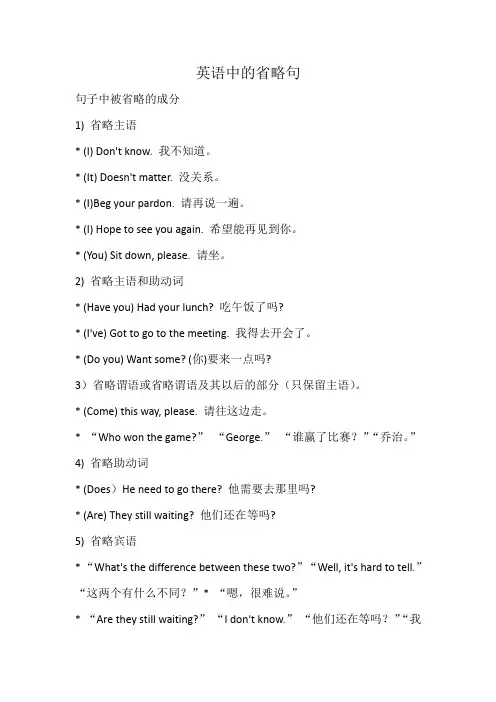
英语中的省略句句子中被省略的成分1) 省略主语* (I) Don't know. 我不知道。
* (It) Doesn't matter. 没关系。
* (I)Beg your pardon. 请再说一遍。
* (I) Hope to see you again. 希望能再见到你。
* (You) Sit down, please. 请坐。
2) 省略主语和助动词* (Have you) Had your lunch? 吃午饭了吗?* (I've) Got to go to the meeting. 我得去开会了。
* (Do you) Want some? (你)要来一点吗?3)省略谓语或省略谓语及其以后的部分(只保留主语)。
* (Come) this way, please. 请往这边走。
* “Who won the game?”“George.”“谁赢了比赛?”“乔治。
”4) 省略助动词* (Does)He need to go there? 他需要去那里吗?* (Are) They still waiting? 他们还在等吗?5) 省略宾语* “What's the difference between these two?”“Well, it's hard to tell.”“这两个有什么不同?”* “嗯,很难说。
”* “Are they still waiting?”“I don't know.”“他们还在等吗?”“我不知道。
”6)省略主语和谓语* No, there won't. 不,不会有。
* Yes, there will. 是的,将会有。
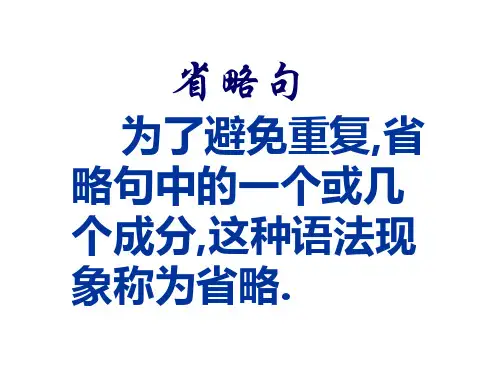
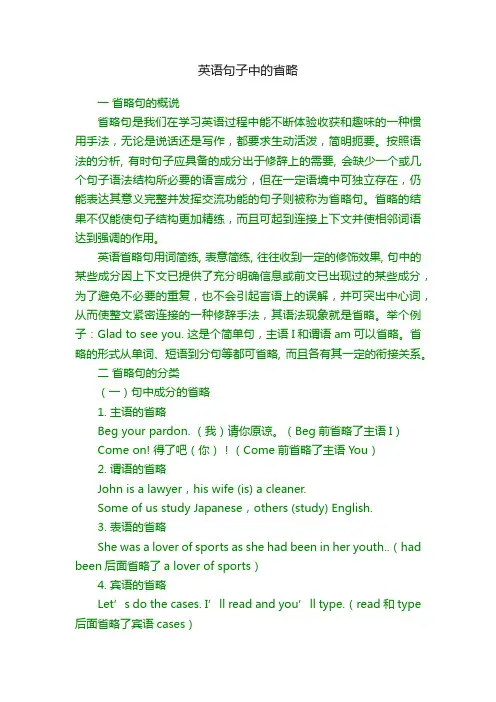
英语句子中的省略一省略句的概说省略句是我们在学习英语过程中能不断体验收获和趣味的一种惯用手法,无论是说话还是写作,都要求生动活泼,简明扼要。
按照语法的分析, 有时句子应具备的成分出于修辞上的需要, 会缺少一个或几个句子语法结构所必要的语言成分,但在一定语境中可独立存在,仍能表达其意义完整并发挥交流功能的句子则被称为省略句。
省略的结果不仅能使句子结构更加精练,而且可起到连接上下文并使相邻词语达到强调的作用。
英语省略句用词简练, 表意简练, 往往收到一定的修饰效果, 句中的某些成分因上下文已提供了充分明确信息或前文已出现过的某些成分,为了避免不必要的重复,也不会引起言语上的误解,并可突出中心词,从而使整文紧密连接的一种修辞手法,其语法现象就是省略。
举个例子:Glad to see you. 这是个简单句,主语I和谓语am可以省略。
省略的形式从单词、短语到分句等都可省略, 而且各有其一定的衔接关系。
二省略句的分类(一)句中成分的省略1. 主语的省略Beg your pardon. (我)请你原谅。
(Beg前省略了主语I)Come on! 得了吧(你)!(Come前省略了主语You)2. 谓语的省略John is a lawyer,his wife (is) a cleaner.Some of us study Japanese,others (study) English.3. 表语的省略She was a lover of sports as she had been in her youth..(had been后面省略了a lover of sports)4. 宾语的省略Let’s do the cases. I’ll read and you’ll type.(read和 type 后面省略了宾语cases)5. 定语的省略I spent part of the money, and the rest I gave.(the rest后面省略了定语of the money)6. 状语的省略She wasn’t cry. Strange! (Strange前面省略了状语how)7. 词的省略1)名词、冠词、物主代词或介词如果与前文重复时,可以省略,如:I like red wine better than white (wine).The lightning flashed and (the) thunder crashed.Please take good care of these flowers and (these) plants.We lived in Beijing and (in) Shanghai for some time.2)重复出现的形容词,省略后边的;两个或两个以上被形容词修饰的同一名词,前边的则常被省略。
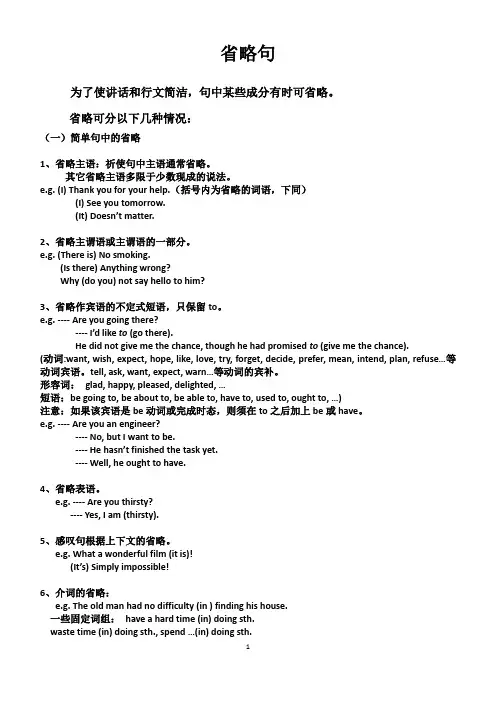
省略句为了使讲话和行文简洁,句中某些成分有时可省略。
省略可分以下几种情况:(一)简单句中的省略1、省略主语:祈使句中主语通常省略。
其它省略主语多限于少数现成的说法。
e.g. (I) Thank you for your help.(括号内为省略的词语,下同)(I) See you tomorrow.(It) Doesn’t matter.2、省略主谓语或主谓语的一部分。
e.g. (There is) No smoking.(Is there) Anything wrong?Why (do you) not say hello to him?3、省略作宾语的不定式短语,只保留to。
e.g. ---- Are you going there?---- I’d like to (go there).He did not give me the chance, though he had promised to (give me the chance).(动词:want, wish, expect, hope, like, love, try, forget, decide,prefer, mean, intend, plan, refuse…等动词宾语。
tell, ask, want, expect, warn…等动词的宾补。
形容词:glad, happy, pleased, delighted, …短语:be going to, be about to, be able to, have to, u sed to, ought to, …)注意:如果该宾语是be动词或完成时态,则须在to之后加上be或have。
e.g. ---- Are you an engineer?---- No, but I want to be.---- He hasn’t finished the task yet.---- Well, he ought to have.4、省略表语。
初中英语省略句用法省略句是英语语法中一种常见的句子结构,通过省略一部分语言成分,以简化句子表达或强调句子中的关键信息。
正确运用省略句可以使句子更简洁明了,提高表达效果。
本文将探讨初中英语中常见的省略句用法,并举例说明其正确运用。
一、主语省略主语省略是省略句的常见形式之一。
当主语在前文已经提到或容易推断时,可省略主语,只保留谓语动词。
例1:— Who is your favorite teacher?— Mr. Smith is.(省略句:Mr. Smith is my favorite teacher.)例2:— Have you finished your homework?— Not yet. Will do after dinner.(省略句:I will do my homework after dinner.)二、谓语动词省略谓语动词省略是省略句的另一个常见形式。
当谓语动词与前文中的相同或相似,并且上下文语境明确时,可将谓语动词省略。
例1:He can play the guitar and I can too.(省略句:He can play the guitar and I can play the guitar too.)例2:She likes singing and dancing, and her brother likes singing too.(省略句:She likes singing and dancing, and her brother likes singing too.)三、宾语省略宾语省略是省略句的又一常见形式。
当宾语在前文已经提到或容易推断时,可将宾语省略。
例1:— Did you get the message I left you?— Yes, received it.(省略句:Yes, I received the message.)例2:— Are you going to the concert with us?— Sorry, can't. Have another plan.(省略句:Sorry, I can't go to the concert with you. I have another plan.)四、介词短语省略在介词短语中,当后一个成分与前一个短语中的某个成分相同或相关时,可将重复的成分省略。
A. 在对话、交际中◎在回答他人的问题时,根据问题的类型和性质,只作简短的回答。
如:(1)—Do you like playing volleyball? 你喜欢打排球吗?—Yes, I do. 是的,我喜欢。
(2)—Who is talking with our teacher? 谁在跟我们的老师谈话?—Our headmaster. 我们的校长。
(3)—What is your favourite subject? 你最喜欢哪一学科?—English. 英语。
◎谈论事物时,接着人家的话,发表自己的观点、看法,常省略相同的部分。
此时,被省略的成分可根据上文内容补出。
如:(1)—Maths is very difficult. 数学很难。
—But very important and useful. 但是很重要、很有用。
(2)—Ann is very clever. 安妮很聪明。
—And very diligent. 并且也很勤奋。
◎表达心里感受时,主语、系动词常被省略。
如:(1)—How do you find English?你认为英语怎么样?—Very interesting. 很有趣。
(2)—Nice to see you again. 又见到你真高兴。
(3)—What do you think about this film? 你认为这场电影怎样?—Very disappointing. 非常令人失望。
B. 在某些句型中◎祈使句中的主语常被省略(1)Go and open the window. 去把窗户打开。
(2)Follow me, please. 请跟我来。
(3)Be bold but don’t be shy. 胆大一点,不要害羞。
(4)Don’t worry about them. 不要为他们操心。
◎感叹句在发出感慨时,为了表达出强烈的感情,常省略主语、系动词或谓语动词等。
如:(1)What a good girl! 多好的女孩啊!(2)How beautiful! 多美啊!一、在对话、交谈中1.回答问题时,往往可省略从句或主句中的某些成分、甚至整个从句或主句。
省略句一. 概念英语中,为了避免重复,常常省略句子中的一个或几个成分,这样的句子叫省略句二.相关知识点精讲1. 简单句中的省略:在对话中,交谈双方都知道谈论的对象,则可以省略句子的主语,省略主语和谓语的现象在交际用语中出现的很多。
(1)Looks like rain.(2)Hope to hear from you soon.(3)Sounds like a good idea.(4)Beg your pardon.(5)Feeling better today ?(6)This way, please.(7)—What does he want to eat ?—Some rice and vegetables.(8)Anything I can do for you ?(9)Sorry to hear that.(10)Doesn’t matter.(11)Terrible weather!(12)Pity you couldn’t come.2. 并列句中的省略:在并列句中,相同的成分如主语,谓语,宾语等都可以省略:(1)They learn French and we English.(2)My father planned and built all these houses.(3)John won the first race and Jimmy the second.(4)Coral is not a plant but a variety of animal life.3. 复合句中的省略:定语从句:(1)That’s the reason he is late for the conference.(2)I don’t like the way he talks.状语从句:(1)If heated, water will boil.(2)Tom was attacked by cramp while swimming across the river.(3)We’ll go to help you if necessary.(4)Had I time, I would come.(5)I’ll go, should it be necessary.(6)The captain can find a boat quicker than we can.宾语从句:如果宾语从句中的谓语部分与主句的谓语部分或上文的谓语部分相同,可将从句部分的谓语省略。
高考英语考点-省略句省略句是高考考查的语法重点,又是学习的难点。
在英语中,为了使句子简洁明快,突出重点,常用"省略句",只要不影响句意的表达,能省略的成分尽可能省略。
省略现象随处可见,大致可分为以下几种情况。
一、句子成分的省略1. 省略主语。
如:Haven't seen you for ages!好久不见了!2.省略谓语。
如:(Is there) Anything you want? 你要什么东西吗?(Does) Anybody need help? 有人要帮忙吗?3. 省略宾语。
如:I don't know (where he is ). 我不知道。
4.省略主语和谓语(或谓语的一部分),只剩下表语、宾语、状语或其它成分。
如:(I'm) Afraid I can't come. 恐怕我不能来了。
(Have you) Got any ink? 你有墨水吗?【高考链接】-It’s a long time since I saw my sister.(2007全国卷1)-_________her this weekend?A. W hy not visitB. Why not to visitC. Why not visitingD. Why don’t visit解析:答案为A。
本题考察省略结构,这里why not visit =Why didn’t you visit ,这种既注重基础又兼顾生活交际的试题,其实多数学生感觉很容易能得出正确的A答案。
二、复合句的省略1.在含有状语从句的复合句中由when,while,as, once,whenever引导的时间状语从句;或由if,unless引导的条件状语从句;由though,although,even if ,even though引导的让步状语从句;由as though,as if,as引导的方式状语从句;由because引导的原因状语从句;由wherever引导的地点状语从句,若从句的主句是it或与主句的主语相同,且在谓语中含有be时,常省略从句的主语和be。